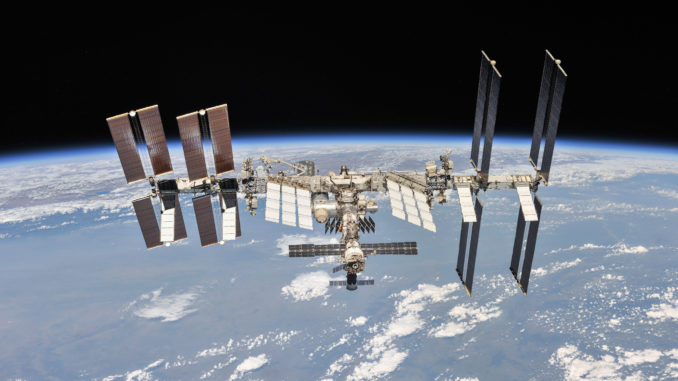
Over the next week there are numerous opportunities to spot the International Space Station (ISS) as it passes over the UK.
The ISS is a large spacecraft that is in orbit around the Earth at an altitude of roughly 250 miles travelling at 17,500 mph. The ISS is a collaborative effort between several nations. It serves as a home for astronauts and cosmonauts while performing as a science laboratory.
From today until Saturday 4th April, we in the UK have the opportunity to see the ISS pass overhead, with quite a few child friendly timings.
From earth the space station looks like an aeroplane or a very bright star moving across the sky, except it doesn’t have flashing lights or change direction. It will also be moving considerably faster than a typical aeroplane (aeroplanes generally fly at about 600 miles (965 km) per hour; the space station flies at 17,500 miles (28,000 km) per hour).
This table gives an example of the viewing times from Birmingham, other parts of the UK will be similar but you can find the exact times for your location here: https://spotthestation.nasa.gov/home.cfm
| Date | Visible | Max Height | Appears | Disappears |
|---|---|---|---|---|
| Fri Mar 27, 7:42 PM | 4 min | 78° | 27° above W | 18° above E |
| Fri Mar 27, 9:17 PM | 2 min | 25° | 10° above W | 25° above W |
| Sat Mar 28, 8:30 PM | 3 min | 61° | 18° above W | 56° above SSE |
| Sun Mar 29, 8:44 PM | 4 min | 71° | 33° above W | 18° above ESE |
| Sun Mar 29, 10:19 PM | 1 min | 21° | 11° above W | 21° above WSW |
| Mon Mar 30, 9:32 PM | 3 min | 38° | 14° above W | 36° above S |
| Tue Mar 31, 8:46 PM | 4 min | 49° | 25° above W | 16° above SE |
| Tue Mar 31, 10:22 PM | < 1 min | 13° | 11° above WSW | 13° above WSW |
| Wed Apr 1, 9:34 PM | 3 min | 21° | 10° above W | 19° above S |
| Thu Apr 2, 8:48 PM | 4 min | 29° | 18° above WSW | 12° above SSE |
| Fri Apr 3, 9:38 PM | 1 min | 10° | 10° above SW | 10° above SSW |
| Sat Apr 4, 8:50 PM | 4 min | 15° | 10° above WSW | 10° above S |
The diagram below helps to explain where in the sky to look to see the ISS:

You can find some great videos provided by NASA (and the other space agencies involved) on YouTube, these will help provide background information and some context for children about the ISS and what they are seeing.
